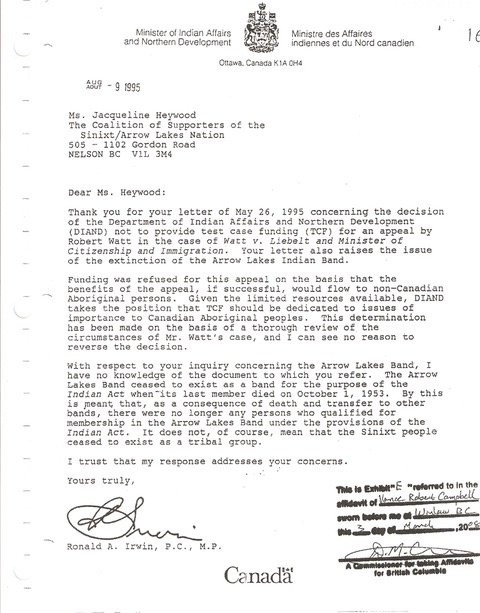
The Autonomous Sinixt
Far From Extinct

The Autonomous Sinixt are currently engaged in upholding their Indigenous rights and responsibilities in their unceded and ancestral tmxʷulaʔxʷ (traditional territory). In an act of bureaucratic genocide, the Sinixt were declared extinct for the purposes of Canada’s Indian Act in 1956 to make way for the damming of the Columbia River. Sinixt, however, continue to live in diaspora in both Canada and the USA. In 1990, with their active return to the 80% of their territory which is north of the Canada-US border, they began the work of repatriating and reburying ancestral remains. They continue to uphold their traditional laws of whuplak'n and Smum iem by working to protect the land and water, cultural sites and language to pass onto future generations of Sinixt. In accord to their traditional governance system, Smum iem Matriarch, Marilyn James, was appointed by her elders to carry on this work.

With the recent R. v. Desautel court case ruling on hunting rights, misleading headlines claim that Sinixt extinction is now over. Sinixt Peoples are not extinct, it is the only Band recognized in Canada that was deemed extinct by the Government of Canada in 1956, as demonstrated by the letter above. Sinixt extinction as a Band, for purposes of the Indian Act in Canada, remains unchanged. Please read our 23 April 2021 press release for our full response to the Desautel case media coverage.
How To Approach
An increased understanding of the Sinixt experience is required to mend relationships, and implement the Calls to Action from the Truth and Reconciliation Commission. This can be done through seeking guidance, truth, and leadership from Smum iem Matriarch Marilyn James, or integrating Sinixt representation into classrooms, presentations, and anything that may concern Indigenous peoples. Another significant way to strengthen this relationship is to include Sinixt land acknowledgements during meetings, events, gatherings, on institution websites, in email signatures, place signs, etc.
Below are land acknowledgements for oral presentations, gatherings, or virtual environments. As businesses, homes, farms, and everything else were built on unceded Sinixt tmxʷulaʔxʷ (pronounced tem-who-lau-h, meaning homeland) without consent or compensation for the Sinixt Peoples, we also offer an acknowledgment place sign to display.
There are many considerations in making land acknowledgments sincere and meaningful. We encourage you to add the ways that you feel grateful for your connection to this place. We also encourage you to go beyond acknowledging Sinixt tmxʷúlaʔxʷ where you live, play, and work, to consider what actions you are going to take to further support truth and reconciliation with Sinixt.
Acknowledgements are a great place to start. The first part is truth, which is acknowledging that you are on Sinixt tmxʷúlaʔxʷ. The next part, reconciliation, requires action. Consider how you are willing to act to support your statement. If you need assistance, please contact Blood of Life Collective to discuss how you can act to support Sinixt reconciliation.